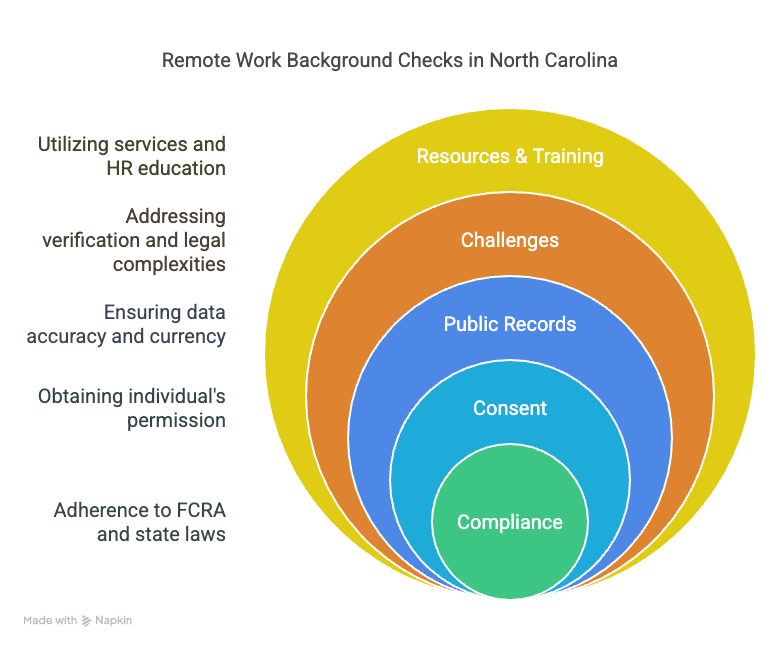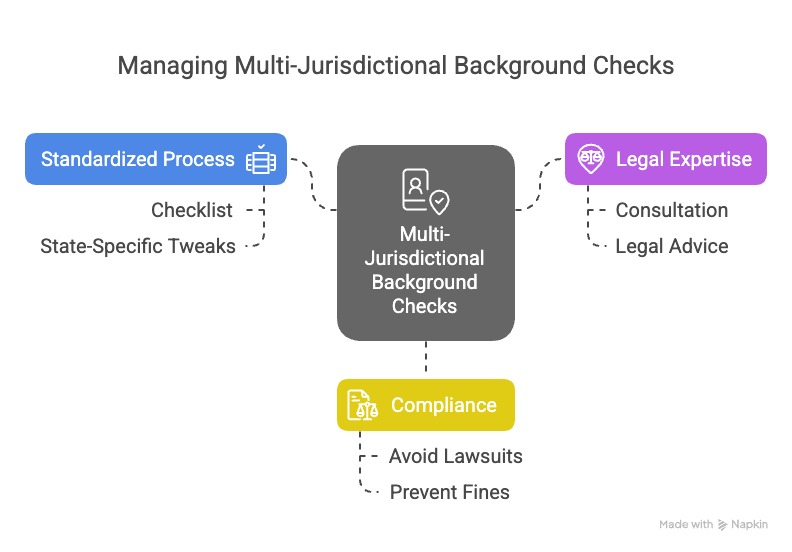With the rise of remote work, companies are finding themselves navigating an increasingly complex web of legal requirements, especially when conducting background checks across state lines. North Carolina is no exception, and understanding how to smoothly implement remote work background checks is critical for compliance and effective hiring. Whether you’re a North Carolina-based company hiring out-of-state employees or vice versa, this guide will walk you through the intricacies of multi-jurisdictional compliance for background checks.
Key Takeaways
- Remote work is reshaping hiring practices, bringing challenges like multi-state compliance in background checks.
- Background checks in remote settings must be adaptable to varying job requirements and different state regulations.
- North Carolina employers must follow both federal and state-specific laws, ensuring background check compliance by obtaining clear consent.
- Hiring out-of-state employees involves understanding varying state laws to maintain a consistent and fair background check process.
- To manage multi-jurisdictional checks, develop a standardized approach and consult legal experts to ensure compliance across states.
Introduction
Remote work isn't just a trend; it's reshaping how businesses hire and manage talent. This shift brings new challenges to the table, especially for companies navigating hiring practices across different states. As a North Carolina employer, you might find yourself hiring someone in another state—or perhaps you're based elsewhere bringing in talent from North Carolina. Understanding how to conduct background checks is crucial in this scenario. They aren't just about verifying facts; they're about ensuring trust and compliance in your remote workforce. This guide will provide you with practical insights for handling these checks while maintaining compliance across state lines. Expect to learn about the legal frameworks, best practices, and specific considerations relevant to North Carolina and beyond.
Understanding Background Checks
Background checks are an essential part of the hiring process. They dig into a candidate's past, offering insights that help you make informed hiring decisions. A typical background check includes identity verification, criminal record checks, and confirmations of both education and past employment. These checks can also extend to driving records, credit history, and professional licenses, depending on the job’s requirements.
In a remote work setting, background checks need to be adaptable. In North Carolina, just like elsewhere, ensuring you're compliant is key. Using technology, you can streamline these checks without compromising accuracy or thoroughness. Tailor the process to focus on aspects most relevant to the remote position. For instance, verify education credentials if the job relies heavily on specialized knowledge. Or check the criminal history for roles involving sensitive data access.
With remote work, you often hire from a broader geographic area. This increase in scope raises compliance challenges with multi-state regulations. Each state has its own set of rules about what you can check and how you need to handle the information. Staying current with both state and federal laws is crucial. This isn’t just about avoiding legal issues; it’s about building a trustworthy team across state lines.
Make sure your processes are robust yet flexible enough to accommodate these complexities. Regularly review your background check policies and adapt as laws evolve. It's not just about ticking boxes. It’s about ensuring safety, security, and compliance in a dynamic work environment. Are your current practices up to the task?
North Carolina Remote Work Background Checks
When it comes to conducting remote work background checks in North Carolina, understanding the state's specific regulations is crucial. North Carolina follows the federal Fair Credit Reporting Act (FCRA), which governs how background checks should be conducted. Additionally, state-specific laws have their own nuances.
North Carolina requires consent from the individual before initiating a background check. This consent must be clear and separate from other agreements. Failing to obtain it can result in non-compliance issues.
Public records play a significant role in background checks. North Carolina's laws mandate that any information obtained from public records must be complete and current. Employers need to be diligent in ensuring that the data they use is up-to-date and accurate.
Conducting background checks for remote workers can present challenges. Verifying past employment or education can be difficult when documents are held in different locations. Additionally, when workers are based in another state, interplay between state laws complicates the process.

A common challenge is the delay in obtaining records due to different public record systems across states. Utilizing a background check service with robust systems in place can mitigate this. These services understand differences in state laws and can help streamline processes.
To navigate these challenges, regular training for HR personnel is vital. Keeping up to date with changes in state laws and regulations ensures your processes remain compliant.
In summary, conducting remote work background checks in North Carolina requires careful attention to state-specific laws and an understanding of compliance requirements. Utilizing available resources and consistent training are effective ways to handle these challenges.
NC Out-of-State Employee Screening
Screening out-of-state employees is crucial for maintaining a consistent and fair hiring process. It ensures you're not only meeting your state's legal requirements but also those of the state where the employee resides. Discrepancies in state laws can complicate this, and understanding these nuances can save you from legal pitfalls.
When hiring employees in different states, you're dealing with more than just North Carolina's regulations. For instance, some states restrict the kind of information you can obtain or how you use it. California, for instance, has stricter privacy laws compared to North Carolina. Familiarizing yourself with these differences is the key. You might need to adjust how you conduct background checks depending on the candidate's location.
Consider initiating a system that flags any jurisdiction-specific requirements before proceeding with a background check. This kind of system can prevent missteps in the hiring process. For instance, if you're hiring a remote employee based in Massachusetts, know that they require a unique consent form that differs from North Carolina.
Take, for example, a tech company in Raleigh that expanded its workforce across state lines. They recognized early on the need for standardized yet flexible screening processes. By collaborating with a legal team knowledgeable in multi-state employment laws, they implemented a system to automatically adjust checks according to the employee's state. This foresight saved them from legal complications and ensured a smooth hiring process.
Is your current system adaptable enough to handle these variations? If not, it might be time to reassess and adjust your processes. Understanding and navigating the complexities of different state laws isn't just about compliance; it's about effective and responsible hiring.
Multi-Jurisdictional Checks in NC
Managing background checks across multiple jurisdictions can feel like a puzzle. Each state has its own set of rules, and keeping them straight is crucial for North Carolina businesses hiring remote workers. These regulatory differences mean you have to juggle various compliance aspects without dropping the ball.
Start by establishing a standardized process that considers the nuances of each state’s laws. A uniform framework helps ensure checks are consistent and fair, regardless of where your employees are based. This involves creating a checklist that covers common elements while allowing room for state-specific tweaks. For example, some states have stricter consent requirements or different rules around accessing certain public records.
Consulting with legal experts is crucial in this area. They can help you navigate the labyrinth of state and federal regulations. Keeping your process legally sound can also safeguard you against potential lawsuits and fines. Lawyers well-versed in employment law can provide clarity and help avoid common pitfalls.

By prioritizing a consistent approach and leveraging legal expertise, your company can maintain compliance while tapping into the broader talent pool that remote work offers. Are your background check processes equipped to meet these complex demands?
Best Practices for Compliance
Regular policy updates are essential. Laws change frequently, and you should mirror these changes in your company's background check procedures. Make it a habit to review both federal and North Carolina laws on a set schedule. This proactive approach can prevent compliance issues before they arise.
Engage with reputable screening services. Partnering with certified background check companies ensures accuracy and adherence to the multi-jurisdictional requirements you face when hiring remotely. These services can help you manage the nuanced differences between states efficiently.
Training your HR team is crucial. They should be well-versed in current regulations and the specifics of your screening policies. Develop clear, written policies that detail the steps for conducting background checks. This clarity protects your company and helps maintain consistency across the board.
By staying informed, using professional services, and investing in training, you set a strong foundation for lawful and effective background checks.
Resources and Tools
When you're diving into the complexities of conducting background checks, it's crucial to arm yourself with the right tools and resources. Here are a couple of internal resources that can help streamline your efforts and ensure compliance.
- GCheck Blog: This blog is a goldmine for those looking for the latest insights and updates on background screening. From navigating legal changes to tips on conducting thorough checks, it covers a variety of topics that can aid your understanding and implementation of effective background checks.
- Policy Templates: Consistency is key when it comes to background checking processes. Developing standard policy templates can help ensure that every check is conducted with the same thoroughness. These templates serve as a blueprint, allowing you to maintain uniformity across different jurisdictions and scenarios. This approach not only aids in compliance but also in maintaining the integrity of your hiring process.
- The U.S. Department of Labor provides valuable guidance on federal hiring practices, accessible through their website. This resource helps ensure that your processes align with applicable laws and regulations, offering a sound foundation as you expand your workforce across state lines. By familiarizing yourself with federal guidelines, you can make more informed decisions for your organization’s unique needs.
Equipping yourself with these resources can make a significant difference in how smoothly you can handle background checks for remote work settings, especially when dealing with multi-state compliance.
Conclusion
Proper compliance with background check regulations is crucial. Employers in North Carolina must adhere to these laws not just to avoid penalties, but to make informed hiring decisions. Regular reviews of your background check processes ensure they remain current and effective. Proactivity in maintaining compliance is essential for smooth operations and is a key part of hiring remotely.
Remote work continues to evolve, and so must your background check strategies. Implementing robust processes supports not just compliance, but also the growth and security of your remote workforce. This diligence can make a significant difference in the success of your business model by fostering trust and reliability.
Frequently Asked Questions (FAQs)
Do NC background checks apply to remote workers in other states?
Yes, if you hire a remote worker based in another state, you must comply with both North Carolina and the worker's state laws for background checks.
How can you verify education for remote hires in NC?
Request official transcripts or diplomas directly from the educational institutions. Use third-party verification services for additional confirmation.
Can NC employers require drug tests for remote workers?
Yes, but you must follow the laws in both North Carolina and the remote worker's state, as both may have different requirements and limitations.
Are NC companies liable for other states’ laws?
Yes, when you employ workers in other states, you are subject to the employment laws of those states in addition to North Carolina laws.
How should you handle county-specific checks for NC remote hires?
Conduct checks in both the county where the job is located and the county where the remote hire resides, as separate jurisdictions may have relevant records.
Can remote workers sue NC employers for FCRA violations?
Yes, remote workers can sue if they believe their employer has violated the Fair Credit Reporting Act in conducting background checks.
Do international remote workers fall under NC laws?
Not directly. International workers are primarily subject to their own country’s laws, but any U.S. federal laws applicable to employment must still be considered.
Are gig workers considered remote employees in NC?
Gig workers are generally considered independent contractors, not employees, which subjects them to different rules compared to remote employees.
What’s the cost of multi-state checks for NC employers?
Costs vary based on the number of jurisdictions checked and the services used, ranging from a few hundred dollars to more per worker.
Does NC require I-9 verification for remote hires?
Yes, federal law requires all U.S. employers to complete and retain a Form I-9, even for remote hires.
Can you hire remote workers as independent contractors in NC?
Yes, but ensure they meet the criteria for independent contractors, which differs from employee classification.
What tools are recommended for managing remote employees in NC?
Consider project management software like Asana or communication tools like Slack to enhance collaboration and efficiency.
How do NC workers' compensation laws apply to remote workers?
Remote workers in NC are covered by workers' compensation, provided their injuries are work-related and occur during job duties.
Is there a specific tax requirement for remote workers in NC?
Remote workers must comply with tax requirements in their own state and report income as required by both state and federal laws.
Definitions
Background Checks
A background check is a process employers use to confirm a candidate’s identity, qualifications, and history before hiring. This often includes criminal records, education, employment verification, and credit history. For remote roles, checks may vary based on job duties and state laws. For example, a role handling financial data might require a credit report review, while a tech job could focus more on certifications.
Fair Credit Reporting Act (FCRA)
The FCRA is a federal law that sets the rules for how background checks must be conducted. It requires employers to get written consent from a candidate, inform them if adverse action is taken, and allow them to dispute inaccurate reports. If you’re hiring remotely, make sure your screening vendor follows FCRA standards, as violations can lead to legal issues.
Consent
Consent means getting written permission from a job applicant before running a background check. In North Carolina, this must be a clear, standalone document—not hidden in other forms. Without it, you're not only breaking the law but also risking trust with candidates. Always explain what will be checked and why.
Multi-State Compliance
When hiring remote workers from different states, you must follow employment laws in each location. Some states—like California or Massachusetts—have stricter rules on privacy and consent. Failing to align with another state’s laws can result in denied hires or regulatory penalties. A checklist or software that flags state-specific steps can help you stay consistent.
HR Policy Training
HR policy training means educating your hiring team on current laws, your internal procedures, and how to apply them in real-world scenarios. This is especially important when hiring across state lines. For example, train your team to recognize when an out-of-state hire needs a different consent form. Regular updates help them stay ready to handle changes in background check laws.
References
- HBR On Remote Work Relationships: https://hbr.org/2024/11/research-how-wfh-can-actually-strengthen-bonds-between-coworkers
- HR Grapevine Summary: https://www.hrgrapevine.com/us/content/article/2024-11-15-hbr-research-suggests-remote-work-strengthens-employee-relationships
- Economist/BLS Analysis: https://www.theregister.com/2025/05/12/remote_work_leads_to_more_startups/
Still have questions?
Get in touch with our team today for a personalized demo and discover how our tailored volume pricing and packages can drive results for your business!
How useful was this page?*
Note: your comments are anonymous. We use them to improve the website. Do not include any personal details.
Visit our FCRA Compliance Tool or leave a message here if you need a response.
From the blog Explore the GCheck Content Hub

Employment Credit Checks: 2026 Guide to Legal Compliance and Best Practices
7 Jan, 2026 • 27 min read
I-9 Form Management Systems: Modernizing Employment Eligibility Verification for 2026
6 Jan, 2026 • 19 min read
EEOC Compliance Requirements 2026: Complete Employer Guide to Fair Hiring Practices
29 Dec, 2025 • 24 min readThe information provided in this article is for general informational and educational purposes only and should not be construed as legal advice or a substitute for consultation with qualified legal counsel. While we strive to ensure accuracy, employment screening laws and regulations—including but not limited to the Fair Credit Reporting Act (FCRA), Equal Employment Opportunity Commission (EEOC) guidelines, state and local ban-the-box laws, industry-specific requirements, and other applicable federal, state, and local statutes—are subject to frequent changes, varying interpretations, and jurisdiction-specific applications that may affect their implementation in your organization. Employers and screening decision-makers are solely responsible for ensuring their background check policies, procedures, and practices comply with all applicable laws and regulations relevant to their specific industry, location, and circumstances. We strongly recommend consulting with qualified employment law attorneys and compliance professionals before making hiring, tenant screening, or other decisions based on background check information.

